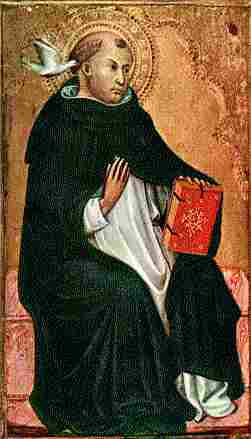
I have posted edited and expanded notes on the nature of rational knowledge taken from my undergraduate days at the Dominican School of Philosophy and Theology initially written by A. Moreno, OP (of happy memory) and M. Dodds, OP. I am immensely grateful for the introduction and instruction in Thomistic philosophy as a young friar under their wise tutelage, especially also of V. Gualiardo, OP (of happy memory).
In these notes you will find such fascinating and controversial topics in the psychology of Saint Thomas Aquinas as:
- Rational Knowledge (Intellect)
- What is unique and distinctive of human beings.
- Object of the Intellect: Material Object, Common Formal Object, and Proper Formal Object, Singular Material Objects, Suprasensible Reality
- Acts of the Intellect: Simple Apprehension, Judgment, Reasoning
- Abstraction: Phantasm, Agent Intellect, Potential (Possible) Intellect, Intellectual Memory
- Spiritual Nature of the Human Soul

Thanks for this post!
In the same way that Kant, through reading Hume, could say that he awoke from a dogmatic slumber – it was through reading Aquinas that I awoke from my rationalist stupor!
But I have a question: How possible is it to properly understand and fully grasp the significance and relevance of Aquinas today, apart from a knowledge of 1) The Trivium; 2) The Medieval Transcendental Thought World; 3) The Hierarchy of Being.
As one who has only a few years ago “crossed the Tiber” and abandoned Protestantism to embrace the Catholic faith, all of this information has come to me in bits and pieces, through my own efforts to study the issues out, even at the cost of sacrificing some material well-being and social stability and integration in this industrialist, consumerist age… It would be helpful if there was some kind of coherent scheme or framework which explained how all these separate, yet seemingly interrelated, things – the Trivium, the Hierarchy of Being, the Transcendentals, and the Medieval Worldview – are connected. Perhaps you could provide some guidance in this regard.
Looking forward!
LikeLike
I am glad that you found my post helpful. Welcome home to the Catholic Church. I pray you grow into the fullness of God’s grace here.
As far as finding a coherent scheme or framework, I had never thought of the Trivium explicitly of providing that, but I do suppose it should as it embodies (metaphorically) Aristotle’s moderate realism, or what I refer to as the “reality of essential natures.” I think the modern world is still reeling from their denial by nominalists in the 14th century. While hardly anyone is a thoroughgoing nominalist these days, nominalistic tendencies are still present in the two lingering modern reactions against it: scientism and Protestantism. I don’t know if you’re already familiar with him, but Bishop Robert Barron is pretty good at connecting the reality of essential natures or coinherence of form/word to the truths of the faith. His Catholicism book is a good popular presentation, and his Exploring Catholic Theology is a little more scholarly, though accessible. You might also go to his influences: Joseph Ratzinger (Pope Benedict XVI), Introduction to Christianity, and Robert Sokolowski, The God of Faith and Reason.
LikeLike
I will leave one more comment, by way of explaining why I believe my question is pertinent, especially in this time of moral scepticism and reductionism.
Catholic moral philosophy teaches that there are three sources of morality:
1) Object – What I choose
2) Intention – Why I choose
3) Circumstances – How other factors – including consequences – influenced my decision
I cannot help but think that there must be some kind of correspondence between these three sources of morality, the Grammar, Logic and Rhetoric of the Trivium, the three Acts of the Mind, and the Transcendentals…
Somehow I believe that understanding the link between these is vital to address the confusion in moral philosophy today, because it may facilitate in communicating Aquinas’ ideas and arouse interest for Thomism in the mostly apathetic audience our modern society has become.
LikeLike
These three-fold ways are interesting, but I don’t see obvious connections. All three acts of the mind are employed in all sciences. And there are more than three transcendental attributes or qualities: Being, One, True, Good, Beautiful, Thing (Itself), and Something (Not Another). Saint Bonaventure was very fond of finding trinities in nature as vestiges of the Holy Trinity, but he was an Augustinian theologian and Franciscan friar. Still holy and learned.
LikeLike